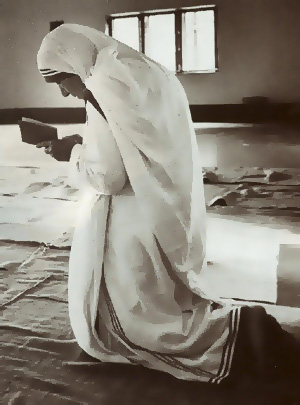I
do not think that Agnes Bojaxhiu, mother Teresa, highlight of devotion
to human misery, highlight of solace, used to have doubts. I do not
think that she entertained doubts about the Light, ever.
A woman that does not believe in the Creator, and that does not believe
in the great hopes the Creator cherished, and has not ceased to
cherish, that his creature would eventually agree to live happy some
day, that woman could not, not out of patience specifically divine,
devote her love and life to the creature whom only freedom
and delight
to sin make suffer and be wretched and
mortal (Rev of
Arès 2/1-5).
 A woman that believes in man believes in God's
image
(Genesis 1/27),
believes in God in some way or other, whether expressly or silently.
That woman moreover has a spiritual life very special in beauty
(Rev of Arès 12/3).
A woman that believes in man believes in God's
image
(Genesis 1/27),
believes in God in some way or other, whether expressly or silently.
That woman moreover has a spiritual life very special in beauty
(Rev of Arès 12/3).
Therefore, why the letters that the news are currently commenting on,
through which mother Teresa told her doubts, her "emptiness"?
Plain is the answer. Whoever finds out the Truth—Truth
is
that the world has to change (28/7)—just as I found it out,
albeit
under quite different circumstances, reaches the same dilemma, and then
the same emptiness.
Anybody, even a grande dame of charity in Calcutta (India) or an
undeserving petty fellow made a prophet in Arès
(France),
dismisses the religious, theological God and Christ, when he or she
discovers the teleological Father and Jesus, the real
Father and
Jesus of the true ends (Rev of Arès
XXXIV/1-4), of the real relationship between the means and
the
ends, the means to conquer evil and the ends of the Good,
the Victory
of which the men of the time to come (Rev of Arès 30/13)
will
have to carry out.
It was as a woman that mother Teresa discovered Truth.
It was
as a woman that for decades she was confiding in her religious friends
about her "emptiness"—just a cultural "emptiness"—that the
discovery had dug deep within her. It was as a woman, that is, in a
modest, limited way, because as a nun fully dependent upon the catholic
church socially and financially, that she from instinct felt that she
should cautiously hide the Core
of her thought. She
"just shut up," as people say. She alluded to her doubt without her
scratching its surface, for fear (rightly or wrongly) that she might
find herself in some social and financial death, just as I would find
myself twenty years later. But as a man, a man in his prime, I was able
to overcome the isolation complete and financially helpless, into which
the Truth I had been given by Jesus had thrown me
and my family.
Yes, I did experience Teresa's "emptiness." But such an emptiness holds
more Truth than all of the ideas quirky or
dishonest, though
very spick-and-span, which mankind through religion and politics, all
of their vainglories, has thought she had to garrison it.
Some ask me: Why will the catholic church canonize mother Teresa?
Wasn't she obviously having doubts about the church?
Canonizing is building the invisible mausoleum on
top of a dead
person that people are strongly urged to pray to. A
piety
that I am in charge of banning (Rév
d'Arès 33/35), it's
true, but I have issued the ban, it is The Revelation of Ares.
The church agrees or turns it down, freely in control of
itself
(Rev of Ares 8/1) just as any assembly
on earth.
I figure that, in the tough world, it may not be improper to show the image
of a woman who quenched motherless babies' thirsts,
and
who clothed poor guys, and who tried to be equal
in
devotion with the angels as well as she could (Rév
d'Arès
11/1-3).

 A woman that believes in man believes in God's
image
(Genesis 1/27),
believes in God in some way or other, whether expressly or silently.
That woman moreover has a spiritual life very special in beauty
(Rev of Arès 12/3).
A woman that believes in man believes in God's
image
(Genesis 1/27),
believes in God in some way or other, whether expressly or silently.
That woman moreover has a spiritual life very special in beauty
(Rev of Arès 12/3).